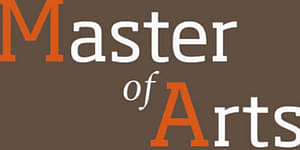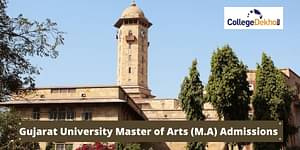Master of Arts (MA)
MA Course Overview
Master of Arts is the full form of the MA, which is a postgraduate degree that focuses on a specific area of the Humanities, such as Philosophy, Art, English, or a Foreign Language. An MA course lasts two to three years and includes advanced courses, seminars, discussions, academic research, and writing. MA Course is available in various specialisation subjects, including Psychology, Sociology, History, English, Hindi, Political Science, Urdu, Economics, Tamil, Odia, etc. Due to which, a Master of Arts (MA) degree can lead to many different career options such as Social work, Teaching, Journalism, Project leadership, Art, Politics, Content writing, Administrative officer, Research associate, Lawyer, Manager, Digital marketer, Data scientist, Insurance executive.
The Master of Arts (MA) syllabus includes core subjects taught in the first year and elective courses in the second year. However, the syllabus for MA courses will differ significantly depending on the specialisation and course chosen. Candidates for MA course admission 2024 must have a BA degree with a minimum of 50% in any field. Further, MA Course admission depends on entrance exams or merit. While some universities consider entrance exam results, others accept students based solely on their class 12 results. The MA course fee in India varies between INR 10,000 and INR 80,000.
Following completion of the MA course, candidates can pursue jobs in their respective subjects and fields of study, earning an MA salary ranging from INR 3 to 15 LPA. Or, they can pursue higher education, such as a Doctor of Philosophy (PhD) in a related field.
Also Read: MBA after MA
Table of Contents
- MA Course Overview
- MA Course Latest Updates
- Master of Arts (MA) Course Highlights 2024
- Why Choose Master of Arts (MA)?
- Master of Arts (MA) Entrance Exams 2024
- Master of Arts (MA) Admission Process in India
- Direct MA Admission Process Without Entrance Exam
- MA Fees in India
- Types of Master of Arts (MA) Courses
- List of Popular MA Specialisations
- What is the Difference Between MA and MSc Degrees?
- MA Syllabus/Subjects
- Top NIRF Ranked MA Colleges in India
- Top Private MA Colleges in India
- Top Government MA Colleges in India
- Scholarships Offered under Master of Arts (MA)
- Career Options After MA
- Courses After Master of Arts (MA) Degree
- What is an Online MA Degree?
- Other Popular Courses
- FAQs about M.A
MA Course Latest Updates
- MA admissions are based on the CUET 2024 entrance exam. The CUET PG 2024 was held between March 11 and March 28, 2024, at 326 CUET PG exam centres.
- The CUET PG 2024 Answer Key is set to be released on April 4, 2024.
Master of Arts (MA) Course Highlights 2024
Following are the major highlights of the Master of Arts (MA) degree programme:
| Degree | Masters |
|---|---|
| Full Form | Master of Arts |
| Course Duration | Master of Arts (MA) is 2 Years |
| Age | No age limit |
| Eligibility Criteria | Bachelor's degree in any discipline Minimum percentage: 45% to 55% (depending upon the institute) |
| Subjects Required | Any (BA in any subject from a recognised university or any other degree with the minimum required aggregate marks) |
| Average Fees Incurred | INR 10k - 80k per annum |
| Average Salary Offered | INR 3 - INR 15 LPA |
| Employment Roles | Content Writer, High School Teacher, Secondary School Teacher, Primary School Teacher, HR Manager, Copy Editor, Editor, Executive Assistant, School Counselor, Data Analyst, Assistant Editor, etc. |
| Placement Opportunities | Accenture, VIBGYOR High, International Justice Mission, HSBC, Crisil, EY (Ernst & Young), Wipro Technologies Ltd., Kotak Mahindra Bank, American Express Co. (AMEX), The Goldman Sachs Group, Inc., etc. |
Also Read: Part Time Language Courses at DU
Why Choose Master of Arts (MA)?
There are several reasons why it would be beneficial for aspirants to study MA courses in India across a range of disciplines and fields of study. From a higher level of expertise and knowledge in the respective fields to rising employment opportunities across different disciplines, industries and sectors. Here are some reasons why you should study Master of Arts courses:
- Greater Expertise: MA courses open up opportunities for those looking to specialise in a specific subject area. Specialists in every discipline and subject area are considered with high regard since they possess the ability to reduce costs and improve results.
- Enhanced Career Prospects: Candidates with increased knowledge, skills and understanding of different fields will usually see higher career prospects. Moreover, MA degrees allow individuals to pursue a career in teaching across different educational institutions as well.
- Pathway to PhD: Those looking to earn a doctorate must apply for a Master of Arts or any other postgraduate degree programme to qualify for the PhD pathway. With a doctorate, students will be able to apply for better-paying jobs and seek out better career opportunities as well.
- Increasing Job Opportunities: Over the years, a variety of different companies and organisations across different sectors and industries have displayed an increased demand for postgraduate degree holders, including MA degree holders.
- Variety in Courses: As mentioned several times previously, aspirants will be able to choose from a range of different disciplines and fields of study like Psychology, Economics, Commerce, Language and Linguistics, Social Studies, and much more.
Master of Arts (MA) Entrance Exams 2024
As stated above, many universities may employ entrance-based admissions to enrol the best students for their MA courses. To enrol in some of the more prestigious institutions, students will have to clear a standardised entrance exam for the two-year postgraduate courses and clear all the remaining steps in the admission process. Listed here are some of the popular MA entrance exams in India.
| Entrance Exam | Description |
|---|---|
| CUET PG | Conducted by the NTA, CUET PG is a national-level entrance exam to enrol applicants to PG courses offered at central or participating universities. |
| IPU CET | All Master of Arts courses offered by GGSIPU will also be done based on the scores achieved in the IPU CET. It is one of the more renowned entrance exams conducted in the country. |
| PU-CET PG | Panjab University conducts the PU-CET PG enrol the best of the best in its PG courses, including the different Master of Arts programmes offered. |
| TISSNET | Conducted by Tata Institute of Social Sciences National Entrance Test, candidates must attempt the test to enrol in the MA programmes offered by the institute. |
Note: The CUET PG score is considered for admission through the JNUEE (JNU) and BHU PET (Banaras Hindu University) entrance exams.
MA Entrance Exams Preparation
The MA courses requires students to be competent in the subject they have selected. To make learning easier, the syllabus can be divided into separate modules. For the purpose of preparing for entrance exams, literary theory and criticism on the relevant subjects are equally important. It is necessary for students to practise answering factual questions. For a better understanding, they may look over past exams and sample papers for the important entrance exams.
Also Read: DU PG Admissions 2024
How to Prepare for CUET 2024?
The National Testing Agency (NTA), which administers the CUET, makes the syllabus for the Common University Entrance Test (CUET) available. Candidates must ensure that they have a thorough understanding of the CUET syllabus in order to be aware of the important topics per section and subject. The CUET syllabus 2024 is divided into three sections: language, domain subject, and general test.
In the first section of the CUET, reading comprehension, literary ability, and vocabulary will be used to assess the candidate's language proficiency. The domain subject section evaluates a candidate's subject expertise for the course for which they wish to apply. The following component, the General Test, assesses the candidate's general knowledge, awareness of current events, and capacity for logical and analytical thought.
Master of Arts (MA) Admission Process in India
MA admissions procedures differ from one college to the next. Some universities require applicants to take an entrance exam, while others admit students solely on merit. However, to be eligible for MA course admission 2024, candidate must meet the eligibility criteria.
MA Course Eligibility Criteria
MA eligibility criteria will be determined by the type of MA course selected by the student as well as the institution offering the course, among other factors. However, much like various other postgraduate courses, there are general requirements that each MA aspirant should satisfy, some of which have been outlined below:
- Applicants must hold a bachelor's degree, preferably in the Arts, with a minimum duration of three or four years, or its equivalent (10+2+3 or 10+2+4). The degree must come from an institution approved by India's University Grants Commission, or UGC
- A minimum of 55% overall in order to graduate
- For those pursuing a four-year degree programme, passing marks in every topic from the first to the sixth semester are required, while candidates pursuing a three-year programme must pass all papers covering topics from the first to the fourth semester
Apart from these MA eligibility criteria, universities and colleges offering the two-year postgraduate courses of choice may define additional requirements or specify the minimum requirements to qualify for enrolment. Therefore, all applicants are advised to thoroughly read through the admission guidelines before applying to any university.
MA Admission 2024
The following steps are being taken for the MA admission process.
.png)
Steps to Apply for MA Course Admission 2024
MA admission is granted in two ways: on merit or through an entrance examination. MA application procedures differ depending on the admission procedure. Applicants can, however, apply to their preferred MA colleges online. To apply for MA courses online, students must fill out an online application form on the official website of their respective universities.
For Entrance Based MA Admission
Candidates can apply for MA courses by completing the following steps:
Step 1: Check for the MA admission form requirements and deadlines listed by various colleges and universities.
Step 2: Register for the MA entrance exams required by the colleges and universities you wish to attend.
Step 3: Once approved, save the application process for future reference. Also, keep an eye on the exam or the university's official website for admission and other important notifications.
Step 4: After taking and passing the MA entrance examination, candidates must fill out an application form for the university of their choice, providing personal information such as academic details, entrance examination results, and so on.
Step 5: Candidates who successfully meet the university's eligibility requirements are shortlisted for the counselling round (if any) to complete the admissions process.
Step 6: After completing the counselling session, candidates must pay the university's entrance fee to confirm their admission to the MA course.
For Merit Based MA Admission
Candidates can apply for MA courses by following the steps outlined below:
Step 1: Complete the online MA admission application form.
Step 2: Pay the registration fee and any additional fees if admission is granted based on merit.
Step 3: Shortlisted applicants will be invited to the next stages of the hiring process, such as individual interviews or counselling.
Step 4: Candidates must submit all required documents and fees in order to confirm their admission to the MA course.
Required Skills for MA Course
Students must possess a few skills that would place them among the best in the field, similar to other professional and postgraduate courses offered across the country. These skills not only improve a graduate's employability, but also help candidates understand the respective fields much better. The following are some required skill sets for MA courses that students should have.
- Excellent communication skills
- Time management skills
- Critical and analytical thinking skills
- Good people management skills
- Technical skills in the respective fields
- Problem-solving skills
- Presentation skills
While students can learn these skills while studying for their desired MA courses in India, it is preferable to learn them before enrolling in the programme. These abilities are required for a lucrative career path and advancement up the career ladder.
Direct MA Admission Process Without Entrance Exam
Many universities, including some of the most prestigious and reputable in the country, only accept student applications based on merit.
- Candidates must provide proof of academic merit by submitting all of their academic records, including degree completion certificates, final examination results, and other documents.
- Candidates must also provide proof of any academic awards they have received during or prior to their undergraduate education. This may improve your chances of being chosen.
- They may be asked to submit Statements of Purpose and Letters of Recommendation as part of the institution's document list.
Furthermore, universities may add or remove processes and steps from their admissions process as needed. Therefore, candidates should thoroughly read and understand the admission policies and guidelines before submitting their application form this year.
MA Fees in India
MA course fees for various colleges range from INR 10,000 - INR 80,000 annually. The Master of Arts course fee will vary depending on a variety of factors, the most important of which is the specialisation chosen for the MA degree. Each university will have its own fee structure for various courses, and many of them will differ depending on the popularity of the course at the institution.
However, there is a minor difference in MA course fees between government and private institutions in India, as shown in the table below.
| Type of Institution | Average Course Fee |
|---|---|
| Government Colleges | INR 10,000 - 20,000 per annum |
| Private Colleges | INR 15,000 - 80,000 per annum |
Types of Master of Arts (MA) Courses
In addition to the courses and specialisations offered with the MA degrees, applicants will have several types of Master of Arts course options to select from in terms of the instructional strategies used. Here are a few of the most well-liked MA course options chosen by students throughout India:
Full-time MA Courses
The most popular course option among applicants, MA full-time courses need students to physically attend lectures in the classroom as well as other academic events hosted by the university awarding the degree.
Part-time MA Courses
Part-time MA courses are popular among those who want to pursue higher education in addition to their jobs or other responsibilities. These courses typically require students to attend certain classes at certain times of the day or night.
MA in Distance Learning
Distance learning is a popular option for aspirants to study their desired MA courses, more so than part-time courses. Since this mode requires students to attempt online classes outside of working hours, they are typically taken up by students who wish to study and work at the same time.
Integrated MA Course
Following the completion of their 10+2 (high school diploma), students can pursue integrated MA courses. The duration of the integrated MA programme is five years. In India, a number of universities, including TISS and University of Madras, provide integrated MA courses. The combined MA degree combinations are listed below:
- BA+MA
- MA+ B Ed
Several different universities offer more than one type of Master of Arts course in India, including courses via distance learning. Therefore, candidates are advised to carry out a thorough research of the best institutes and courses available before sending in their application forms.
List of Popular MA Specialisations
As mentioned above, there are several types of MA specialisations and courses available in India for interested candidates. To begin their Master of Arts programme, a candidate must first select and validate the course or specialisation they want to take. Only then can they begin their master's degree.
Top MA specialisations available to students are listed below:
MA Economics
MA in Economics is designed to provide extensive knowledge of different economic topics like macro and microeconomics, finance and accounting, and much more.
MA English
Covering a range of English language topics, including its history, development, literary pieces of work and much more, an MA in English is one of the more popular options among students.
MA Literature
MA in Literature is often paired with a language such as Hindi, French, Spanish, etc., wherein different literary works of art are evaluated, deconstructed and studied in detail.
MA History
As the name suggests, an MA in History covers a range of topics, events and recorded moments in History that students must study in detail. The topics are not restricted to Indian history or popular moments but cover a range of different timelines, cultures, etc.
MA Political Science
The two-year course imparts specialised knowledge of Indian and international politics. Interested students will be able to pursue a career in politics, governance and international policy using the degree.
MA Psychology
Among the popular course options, MA in Psychology trains and qualifies students in the science of evaluating and treating different mental illnesses and challenges that people face.
MA in Philosophy
Covering a range of topics between classical and modern philosophy, an MA in Philosophy deals with the study of the nature of knowledge and reality, among many other complex theories.
MA in Languages
Similar to English, MA courses in different languages are often a common option taken by those who wish to either teach the language or work in an environment where language proficiency is key.
Note: It should be noted that the courses mentioned above are just a few of the many courses that students can choose from to earn an MA degree. Therefore, candidates are advised to first confirm the field of study in which they wish to build a career, before selecting a specialisation.
Also Read: Best Certificate Courses in India
What is the Difference Between MA and MSc Degrees?
Among the popular degree options available in India, the differences and similarities between MA courses and MSc courses are often discussed, often to answer the question “Which is better: MA vs. MSc?”. To answer this question, we have detailed some of the major differences in the table below to help you determine which of the two is a better option for you.
| Parameters | Master of Arts | Master of Science |
|---|---|---|
| Focus | Focus on arts and humanities of the society, where intricate knowledge of the socio-economic factors of society and culture is studied | Focuses on the scientific knowledge and facts of life, where extensive research and understanding of different STEM-based subjects is studied. |
| Entry Requirements | A Bachelor’s degree in arts or other streams in the respective field of study is the minimum requirement for an MA. Admissions can be done either on entrance test scores or academic merit. | A Bachelor of Science degree in the respective disciplines or fields of studies is the minimum requirement for an MSc. Entrance test scores are usually the commonly accepted mode of admissions, however, few may select candidates on academic merit. |
| Subject Areas | Economics, English, History, Political Science, Psychology, Social Work, Literature, Linguistics, etc | Physics, Chemistry, Biology, Biotechnology, Pharmacology, Microbiology, Accounting, etc. |
| Teaching Methodologies | Variable across universities, MA courses are often taught in a balanced classroom with project-based methodology. Students will be required to attend classroom sessions while conducting their research on different topics as part of the curriculum. | Common across universities, most MSc courses are taught to provide a more hands-on approach to different scientific principles and topics. Students must participate in the laboratory lectures as well as conduct their research on different topics, on which they will be evaluated. |
| Graduate Outcomes | Graduates can take up roles such as professors/teachers, consultants and specialists in their respective fields. The scope of career growth is also immense with a good payout as well. | Graduates can take up roles such as specialists, subject specialists, technicians, R&D executives, etc. in their respective fields. The course often leads to further academics like PhDs, that position the graduates for greater recognition and better payouts. |
MA Syllabus/Subjects
MA Syllabus and MA subjects vary depending on specialisation and course. Most MA course syllabuses, on the other hand, include classroom instruction, lectures, group discussions, field trips, and a required dissertation submission. Humanities, Languages, and many other specialisations are available on MA courses. Following completion of a bachelor's degree, the MA programme is one of the most popular and sought-after courses among applicants. The MA programme provides theoretical knowledge in a variety of academic fields such as psychology, sociology, management, and politics.
Going through the syllabus for the desired courses is one of the helpful factors that can aid you in selecting the right course for your postgraduate studies. However, because MA is a degree, you will need to research the individual MA course syllabus in India before making that decision. Some of the subjects and topics covered in various Master of Arts courses in India are listed below.
| MA Economics Syllabus | |
|---|---|
| Micro Economics | Open-Economy Macro Economics |
| Statistics | Public Economics |
| Time Series Analysis | Industrial Organisation |
| International Trade | Agricultural Economics |
| MA English Syllabus | |
| Structure of Modern English | Tradition English Drama |
| English Fiction | Indian Prose Works |
| American Literature | Literary Criticism and Theory |
| Works of Shakespeare | British Literature |
| MA Psychology Syllabus | |
| Experimental Psychology | Cognitive Psychology |
| Biological Bases of Behaviour | Psychological Assessment |
| Basics of Guidance and Counselling | Psychodiagnostics |
| Organisational Psychology | Counselling Techniques and Strategies |
| MA History Syllabus | |
| Aspects of Ancient India | State and Society of Medieval India |
| Modern India | World History |
| Historiography | Indian Government and Politics |
| History through Literature | The Economic History of India |
| MA Political Science Syllabus | |
| Indian Political Thought | Public Administration |
| Contemporary Political Philosophers | Modern Political Theory |
| Issues of Indian Politics | Foreign Policy in India |
| Indian Administration | International Law |
The subjects and topics covered above are just for reference purposes only and candidates should thoroughly read through the individual syllabus and curriculum of each course at each university to understand what you will be studying for your MA courses in India.
Top NIRF Ranked MA Colleges in India
The top NIRF-ranked MA colleges in India are listed below.
| Rank | Name | City | State | Score |
|---|---|---|---|---|
| 1 | Miranda House | Delhi | Delhi | 74.81 |
| 2 | Hindu College | Delhi | Delhi | 72.39 |
| 3 | Presidency College | Chennai | Tamil Nadu | 71.18 |
| 4 | PSGR Krishnammal College for Women | Coimbatore | Tamil Nadu | 71.05 |
| 5 | St. Xavier`s College | Kolkata | West Bengal | 70.80 |
| 6 | Atma Ram Sanatan Dharm College | New Delhi | Delhi | 70.78 |
| 7 | Loyola College | Chennai | Tamil Nadu | 70.46 |
| 8 | Rama Krishna Mission Vivekananda Centenary College | Kolkata | West Bengal | 69.53 |
| 9 | Kirori Mal College | Delhi | Delhi | 69.32 |
| 9 | Lady Shri Ram College For Women | New Delhi | Delhi | 69.32 |
| 11 | Shri Ram College of Commerce | Delhi | Delhi | 68.86 |
Candidates can also look at Top Colleges in Delhi University (DU) Based on NIRF Ranking 2024 here!
Top Private MA Colleges in India
Popular private colleges that offer MA courses include:
| Name of MA Private College | MA Private College Fees |
|---|---|
| Amity University, Noida | INR 84,000- INR 7,00,000 |
| Christ University, Bangalore | INR 40,000-INR 2,00,000 |
| CMR University, Bangalore | INR 2,00,000 |
| Chanakya University, Bangalore | INR 2,00,000 |
| Loyola College, Chennai | INR 45,000 - INR 96,000 |
| Lovely Professional University, Jalandhar | INR 80,000 - INR 2,00,000 |
| Mount Carmel College, Bangalore | INR 2,00,000 |
| Mithibai College of Arts, Mumbai | INR 97,000 |
| Stella Maris College, Chennai | INR 54,000 – INR 1,00,000 |
| Thapar University, Patiala | INR 1,00,000 |
Note: The figures mentioned above are subject to change.
Top Government MA Colleges in India
A number of government colleges also offer MA courses. Students who are interested in learning about the top government colleges and their fees structures should continue reading. Students can shortlist their preferred institutes based on their qualifications and then prepare for the entrance exams to gain admission.
Popular government colleges that offer MA courses include:
| Name of MA Government College | MA Government College Fees |
|---|---|
| Daulat Ram College, Delhi | INR 35,000 - INR 40,000 |
| Gargi College, Delhi | INR 29,000 |
| Hindu College, Delhi | INR 36,000 - INR 37,000 |
| Hansraj College, Delhi | INR 18,000 |
| Jamia Millia Islamia, Delhi | INR 13,000 - INR 24,000 |
| Lady Shri Ram College for Women, Delhi | INR 36,000 |
| Miranda House, Delhi | INR 29,000 - INR 38,000 |
| Sri Venkateswara College, Delhi | INR 27,000 |
| Ramjas College, Delhi | INR 29,000 |
Note: The figures mentioned above are subject to change.
Scholarships Offered under Master of Arts (MA)
Government schemes and private institutions/organizations offer a variety of scholarships to students interested in pursuing an MA course. The following is a list of a few scholarships available to MA students:
- NSP Post Matric Scholarships Scheme for Minorities
- Sterling and Wilson Solar Scholarship
- Central Sector Scheme of Scholarships for College and University Students
- Post-Matric Scholarships for Students with Disabilities
- NEC Merit Scholarship
- Post-Matric UP Scholarship
- Post-Matric Scholarships for the Students of Minority Communities
- Swami Vivekananda Scholarship
- Symbiosis International Scholarships in India
- Post Matric Scholarship for Minorities (Karnataka)
Career Options After MA
Master of Arts courses in India, which cover a wide range of subjects and disciplines, can lead to extremely lucrative job opportunities for candidates who have prepared for them. Specialists are in high demand across industries and sectors, particularly in finance, political science, psychology, and education. Students enrolled in an MA course in India have numerous job, career, and academic opportunities. The following jobs, career opportunities, and recruiters are known to hire MA degree holders in India. MA candidates have numerous opportunities in industries such as railways, banking, insurance, education, hospitality, research and education, and government. MA graduates can work as a social worker, teacher, journalist, project manager, artist, politician, content writer, administrative officer, research associate, and other positions.
The average salary is between INR 3 and 15 LPA. Because the education market is always busy and expanding, careers after MA Education are in high demand, which raises the salary for MA Education roles. Students who want to improve their chances of finding work and growing professionally can further their education.
MA Job Profiles
Following the completion of an MA degree programme, candidates have two options: they can choose to work for a job or pursue an MPhil or PhD programme. Candidates should be aware, though, that depending on the field they studied, they may receive a job offer following their completion of an MA course.
Following their completion of an MA course, candidates can pursue the following popular job profiles:
| Job Profile | Description | Average Annual Salary |
|---|---|---|
| Teacher | A teacher must also mentor students on a daily basis so that they can not only study their curriculum but also mature into responsible adults. | INR 4-5 LPA |
| Administrative Officer | An administrative officer manages office supplies, prepares expense reports and office budgets, and organises the company's records. | INR 5-7 LPA |
| Social Worker | In this type of job, one must identify and then assist people in dealing with problems. | INR 6-8 LPA |
| Journalist | A journalist is expected to conduct research, write articles, and present news in an honest, unbiased, and ethical manner. | INR 4-7 LPA |
| Counsellor | In such a job, one must speak with individuals who are experiencing personal or professional difficulties and assist them in overcoming their difficulties and making appropriate changes in their lives. | INR 6-8 LPA |
| Professor | Regardless of the discipline or field of study that you choose, you will be able to pursue a career in teaching, provided you take the necessary steps to become a teacher/professor in India. | INR 4-5 LPA |
| Consultant | In fields like economics, political science, history, languages, etc., where in-depth knowledge is crucial, graduates will be able to find consultant jobs that are also high-paying. | INR 2-5 LPA |
| Specialist | Every discipline and field of study under a Master of Arts degree will qualify students to take up jobs in their specialisation. Every field will have individual specialist jobs, with different payrolls and career prospects. | INR 3-5 LPA |
Also Read: Government Jobs after MA Course
Top MA Recruiters
One of the most significant benefits of the MA course is that it provides students with opportunities in a variety of fields. Graduates can find work in the media, publishing, universities, non-governmental organisations, banks, and even multinational corporations. Candidates' pay scales rise as they gain experience and time.
Companies that frequently hire MA graduates include:
| Top Recruiters for MA Graduates | |
|---|---|
| The Times of India | Amazon |
| Hindustan Times | Myntra |
| TCS | BBC |
| Infosys | Accenture |
| Taj | HDFC Bank |
MA Salary After Graduation
Salary and package expectations for MA degree holders after graduation will be heavily influenced by the discipline chosen as well as the type of job role available. However, the job opportunities for MA graduates in India are currently vast and immense. Here is a breakdown of the salary ranges that different MA course graduates can expect to earn in India based on their specialisation.
| MA Course | Salary Package |
|---|---|
| Salary After MA Economics | INR 3 - INR 15 LPA |
| Salary After MA English | INR 2.5 - INR 6 LPA |
| Salary After MA Psychology | INR 3 - INR 7 LPA |
| Salary After MA History | INR 3.5 - INR 5 LPA |
| Salary After MA Political Science | INR 3 - INR 37 LPA |
Note: The salary packages mentioned above should only be used as a guideline because actual salaries will vary depending on a variety of factors, including the employer and the graduate's work experience. Furthermore, the above salaries are for candidates who have recently graduated from MA course in India and can expect to see a significant increase in their salaries with more experience.
In addition, for your reference, the range of salaries and related jobs for MA graduates are tabulated below, taking into account the different job profiles that are available to them.
| Job Profile | Average Salary |
|---|---|
| Content Writer | INR 2.87 LPA |
| Journalist | INR 3.46 LPA |
| Social Worker | INR 3.88 LPA |
| Teacher | INR 5 LPA |
| Consultant | INR 5.5 LPA |
Note: The figures mentioned above are subject to change.
MA Scope After Graduation
Master of Arts courses in India have a wide range of applications because the degree trains and qualifies students for positions such as specialists, consultants, and even teachers/professors. Graduates, on the other hand, have the option of furthering their education. Among these alternatives are:
- PhD: The doctorate in Arts is the highest academic qualification that anyone can obtain in India, but it is also one of the most difficult to obtain. Regardless, the degree qualifies and places degree holders in a unique position to be highly regarded and demanded by academic institutions and others alike.
- Skill-oriented courses: Those who want to broaden their knowledge and skill sets can pursue skill-oriented courses such as marketing or finance, where candidates can expand their career prospects as well as their knowledge. This will prepare them for a life of great career opportunities that await them after graduation.
Courses After Master of Arts (MA) Degree
- Students can choose to pursue PhD studies in their relevant fields after completing their MA. While the requirements for admission to PhD programmes vary, there is no merit-based selection process, so candidates must pass an entrance exam to be considered for a PhD.
- Students can choose to start their professional careers by joining corporations and other organisations in addition to continuing their education. They could also get ready for different government exams and jobs.
PhD After MA
PhD also known as Doctor of Philosophy degree is a 5-year course that deals with an in-depth and intrinsic study of research for any relevant subject. Aspirants are eligible to pursue a PhD course only if they have completed their master’s degree in a similar course/ field/ stream in which they want to pursue a PhD. Some colleges also specify that candidates need to have completed an MPhil to pursue a PhD course offered by them.
Also Read: PhD Admissions 2024
Apart from this, many colleges state that candidates meet the eligibility criteria for PhD programmes offered by them if they have cleared UGC NET. Candidates who want to pursue a PhD in Engineering need to possess a valid GATE score.
What is an Online MA Degree?
An online graduate degree is known as an online master's degree. Either an entirely online college with no in-person experience or a conventionally on-site university with particular online programmes can be used for this. Online MA courses are becoming more and more common because of their comfort and flexibility. Video conferencing is used to deliver lessons for the online MA course. One can enrol in an online MA course while residing in a different city because there are no on-site classes. Furthermore, it allows prospective workers to grow professionally and gain more knowledge at their own pace while learning.
Students can look at the table below to learn about some demanding Online MA Courses:
| Online MA Courses | Course Provider | Fees (in INR) |
|---|---|---|
| Master of Arts in English | Chandigarh University | INR 70,000 |
| Online Master of Arts (Economics) | Chandigarh University | INR 70,000 |
| MA in Journalism and Mass Communication | Manipal University, Jaipur | INR 1,30,000 |
Other Popular Courses
FAQs about M.A
Can I do a PhD without an MA?
Yes, you can do a PhD without an MA. Though the traditional education system enables us to first qualify BA, then a Master's to be eligible for a PhD, students can even pursue a PhD after their BA. However, this traditional path enables many valid reasons to go for a master's before applying for a research or doctoral degree.
What is the difference between an MA and MSc degree?
A postgraduate degree in the social sciences or humanities is referred to as a master's degree. Programmes that concentrate on scientific and mathematical subjects are usually the only ones eligible for the Master of Science degree. Whereas an MSc degree is usually focused on science or research, an MA degree is usually focused on the arts. The Master of Arts degree is not limited to the arts; it can be earned in a variety of subject areas and course areas, such as business and marketing and the social sciences.
Do universities provide postgraduate courses in linguistics?
Yes, there are several universities that offer an MA in Linguistics. Master's degree in Linguistics is of two years and focuses on the systematic study of language as a structure, as well as the various subfields of Linguistics that overlap with other sciences such as Semiotics, Psychology, Sociology, Forensics, and many others, making the subject much more interesting and appealing.
What are careers after an MA in Political Science?
Following an MA in Political Science programme, you can pursue a variety of career paths, including those in mass media, social media, journalism, public relations, campaigning, and politics. Political science students naturally choose to study politics because it is an integral part of every nation. With an MA in Political Science, you can start your political career as a politician, political advisor, or analyst, or you can work as a political leader's assistant. Without a doubt, the most well-known and prestigious job option for young applicants is the Indian Civil Services.
Can I pursue an MA in psychology after completing my BA in history?
No, in order to pursue an MA in psychology, the applicant should have taken psychology as a minor in their Bachelor of Arts (BA). It is a highly sought-after master's programme in psychology at the postgraduate level. The course covers a wide range of psychological topics, including clinical psychology, health psychology, social psychology, psychometry, neuropsychology, the study of emotions and paradigms, and more. Therefore, it is also required of students to hold a bachelor's degree in psychology.
Is a Master of Arts degree worth it?
A master's degree will increase your current salary. A master's degree in fine arts, for example, is less in demand in the labour market and will only result in a small increase in median wages over a bachelor's degree.
Is a career in the arts a good choice?
According to the research, art majors are well prepared for today's dynamic job market, in which job and career changes are the norm. In reality, one of the most significant advantages of majoring in the arts is the ability to be creative in career planning.
What is an MA Honours degree?
The majority of arts, humanities, and social science degrees are awarded with an MA (Hons). These courses last two years and typically include a thesis, which students can submit in their final year of study.
When should I apply for an MA?
The application deadline for the MA course will differ between universities. However, in general, students can apply for the current academic session between January and February.
What is MA fee?
MA course fees for various colleges range from INR 10,000 - INR 80,000 annually.
Which MA course is best?
Some of the top MA courses pursued by candidates are MA in Social Sciences, MA in Political Science, MA in International Relations, MA in Area studies, MA in Cultural Studies, MA in Social Work, MA in Development Studies, MA in Sociology, etc.
What is the MA course?
Master of Arts is a postgraduate course that typically takes two years to complete. Graduate students can only take MA courses. MA is a professional course that provides students with a comprehensive understanding of the topic they have chosen. Applicants can pursue an MA as part-time or full-time courses.
What to do after the MA course?
After the MA course, you can land a job role of your choice or interest. As this higher education will train you for the employment sector, you can start your career as a teacher, lawyer, journalist, digital marketer, manager and various other roles. However, if you are someone who wants to gain more knowledge and experience, then you can go ahead with higher degrees such as a doctorate.
How many subjects are there in MA?
There are mainly four to eight subjects in the MA programme. This same number of core subjects will be present across every specialisation and subject. Apart from the main subjects, you also have to choose from elective subjects, as per your interest. However, the subjects will be different in each course such as English, Economics, Philosophy, or others.
What is an integrated MA course?
An integrated MA course is a combination of a bachelor’s and a master’s degree. These integrated courses are of a total of five years duration. These courses can be pursued after completing class 12. Though the general master’s course is similar to this integrated course it includes a bachelor's for the first three years followed by two years of the period for a master’s degree.
Is maths required for an MA?
No, maths is not required for an MA degree. The subjects covered in this degree are mostly from the arts or humanities stream. However, if you are interested in maths, you will have to complete your bachelor’s in maths or a relevant subject with a minimum of 50% aggregate to be eligible for a master's in maths.
Is an MA possible without a BA?
No, an MA is not possible without a BA. You can only pursue a master’s after completing your bachelor’s or you can do an integrated course which is a blend of both bachelor's and master's comprising of the five-year programme. So, to step in the next path you have to follow the set qualification hierarchy.
Can a BSc student do an MA?
Yes, a BSc student can do an MA course. As for the master’s programme, students can have a background from any stream i.e., science, arts and commerce. So, as long as you have the zeal and meet the eligibility criteria to study any subject, you can apply for a master’s in any field or subject.
Can I do my MA in two subjects?
Yes, you can do your MA in two subjects. However, when two different subjects are pursued in postgraduate degrees you cannot do both of them together. It will be considered invalid to do so. So, the only option is to pursue one after another. Many students go for dual master’s to upscale their knowledge and skills.
What is the easiest subject in MA?
While there are many easy subjects to study, the most common subjects in an MA degree in India that are considered to be the easiest include Creative Writing, Liberal Arts, Psychology, Criminal Justice, Sports Management, Organisational Leadership, HR Management, Accounting, Marketing, Communication, Social Work, Education, Teaching, Nursing, and Second Language Acquisition.
In what job profiles do MA students find work?
MA students can find work in different job profiles such as teacher, professor, social worker, project manager, author, content writer, administrative officer, journalist, research associate, digital marketer, economist and various other roles. As it involves the arts stream, the job roles are also related to the degree course you pursue.
Can I do my MA directly after 12th?
No, you cannot do MA directly after 12th. As class 12, is a school-level qualification, after passing this, you have to first pursue a bachelor’s or undergraduate degree, only then you can study any master’s or postgraduate programme. Also, the eligibility criteria for a master’s required a bachelor’s degree in any discipline.
What is the salary of an MA graduate in India?
The salary of an MA graduate in India ranges between INR 30,000 and INR 50,000 per month depending on various factors such subject of graduation, the organisation, sector, experience, skills, etc. So, before applying for a job role, check the average market demand and average salary package.
Can I do an MA in one year?
Yes, you can do an MA in one year. However, it will be an online and distance course. The core curriculum and syllabus will be covered for one year. Candidates who have qualified for their bachelor’s degree are eligible for an online master’s programme of one year.
How many years is a Master of Arts?
Master of Arts is a two-year postgraduate or master’s programme. This programme can be opted for, post the completion of a bachelor’s degree in any relevant discipline. This postgraduate degree is offered by many different colleges and universities. It is also half the duration of the undergraduate degree, though it is a higher level than undergraduate.
Related Questions
Popular Courses
M.A Colleges in States
M.A Colleges in Cities
M.A Colleges by College Type
- Courses
- Master of Arts










